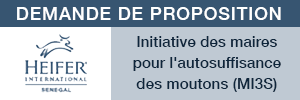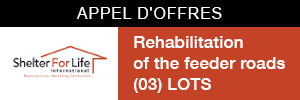.
Consultant.
Overview
• Parent Sector : Natural Sciences Sector (SC)
• Duty Station: Dakar
• Job Family: Natural Sciences
• Type of contract : Non Staff
• Duration of contract : From 1 to 6 months
• Recruitment open to : External candidates
• Application Deadline (Midnight Duty Station Time) : 05-MAY-2025
UNESCO Core Values: Commitment to the Organization, Integrity, Respect for Diversity, Professionalism
Context
Liberia and Sierra Leone, on the Atlantic Coast of West Africa, are highly vulnerable to the impacts of climate variability and change, particularly the increasing frequency and intensity of extreme weather events such as heavy rainfall, flooding, sea-level rise, coastal erosion, and windstorms. The combination of poor sewage systems, inadequate building regulations, and a heavy reliance of their economies on climate-sensitive sectors (agriculture, forestry, mining) exacerbates these vulnerabilities. In Liberia, the predominantly flat landscape and heavy rainfall patterns, coupled with projected increases in rainfall and temperature, further heighten the risk of flooding. Similarly, Sierra Leone experiences frequent floods, landslides, mudslides, and coastal flooding, leading to infrastructure destruction and epidemic outbreaks. Both countries face challenges related to institutional capacity, data gaps, and coordination in disaster risk management. Recognizing the urgent need to strengthen flood response and preparedness, this consultancy aims to assess existing systems, identify gaps, and develop a comprehensive action plan for capacity building.
Objectives
The objective of this consultancy is to strengthen response and preparedness to flooding in Liberia and Sierra Leone by:
• Assessing the effectiveness of existing Early Warning Systems (EWS) and identifying areas for improvement.
• Identifying knowledge gaps in risk data, monitoring, and decision-making for Disaster Risk Reduction (DRR) strategies
• Evaluating the coordination and crisis management mechanisms among relevant stakeholders.
• Developing a comprehensive capacity-building action plan for EWS, monitoring tools, and enhanced coordination for Disaster Risk Management.
Tasks
Assessment of Early Warning Systems (EWS):
• Conduct a thorough review of existing EWS for flood forecasting and warning in both countries, including consultations with relevant government agencies, local communities, and technical institutions, as well as a desk review of existing policies and operational frameworks.
• Evaluate the technical capacity and operational effectiveness of current EWS, including data collection, processing, dissemination, and community engagement.
• Identify strengths, weaknesses, and gaps in the existing EWS.
• Recommend specific measures for strengthening EWS, including technological upgrades, improved data collection, and enhanced communication strategies.
Identification of Knowledge Gaps:
• Assess the availability and quality of data on flood risks, including meteorological, hydrological, and socio-economic data. This with an emphasis on utilizing GIS, remote sensing, and historical flood records to identify gaps in data collection and analysis.
• Identify gaps in data collection, monitoring, and analysis for effective risk assessment and decision-making.
• Evaluate the capacity for data management and utilization for DRR planning and implementation.
Recommend strategies for improving data collection, analysis, and dissemination, including the use of remote sensing, GIS, and other relevant technologies.
Evaluation of Coordination and Crisis Management Mechanisms:
• Conduct consultations, map and analyze the roles and responsibilities of key stakeholders involved in flood risk management, including government agencies, local authorities, civil society organizations, and communities.
• Evaluate the effectiveness of existing coordination mechanisms for disaster preparedness and response. A focus should be given to inter-agency collaboration between national DRR authorities, local governments, civil society organizations, and international partners. (The objective will be to identify opportunities for improving multi-stakeholder coordination, information sharing, and response protocols)
• Identify challenges and bottlenecks in inter-agency coordination and information sharing.
• Recommend measures for strengthening coordination and crisis management, including the establishment of clear protocols, regular simulation exercises, and improved communication channels.
Development of capacity-Building Action Plan
• Based on the findings of the assessments, develop a comprehensive capacity-building action plan for EWS, monitoring tools, and enhanced coordination.
• The action plan should include specific activities, timelines, responsible parties, and resource requirements.
• The action plan should address the specific needs of vulnerable groups, including women and children.
• The action plan should prioritize the development of sustainable and locally appropriate solutions.
• The action plan should include a section for the improvement of meteorological and hydrological data gathering capabilities.
Delivrables
The consultant will submit the following deliverables:
• Deliverable 1: Inception Report- detailing the consultant’s understanding of the TOR, methodology, and work plan, by May 20, 2025.
• Deliverable 2: Assessment Report – comprehensive report detailing the assessment of EWS, identification of knowledge gaps, and evaluation of coordination mechanisms, by June 30, 2025. (The report should be validated through a stakeholder consultation process led by UNESCO Dakar)
• Deliverable 3: Capacity-Building Action Plan – detailed action plan for strengthening EWS, monitoring tools, and coordination for DRR, including specific activities, timelines, and estimated budget, by August 10th, 2025. (good to have a plan for short-term (0-1 year), medium-term (1-3 years), and long-term (3+ years), and a monitoring progress if possible)
• Deliverable 4: Final Report – summarizing the key findings, recommendations, and action plan, by August 31st, 2025.
Competencies (Core / Managerial)
• Accountability (C)
• Communication (C)
• Innovation (C)
• Knowledge sharing and continuous improvement (C)
• Planning and organizing (C)
• Results focus (C)
• Teamwork (C)
• Professionalism (C)
• –
For detailed information, please consult the UNESCO Competency Framework.
Required qualifications
The consultant should possess the following qualifications and experience:
Academic Qualifications
Advanced degree in disaster risk management, hydrology, environmental science, or a related field.
Technical Competencies and Experience Requirements
• Extensive experience (more than 10 years) in conducting assessments and developing strategies for flood risk reduction and preparedness.
• Demonstrated experience in working with EWS, monitoring tools, and data management for DRR.
• Excellent analytical, communication, and report-writing skills.
Desirable qualications
• Strong understanding of the socio-economic and environmental context of Liberia and Sierra Leone.
• Experience with UNESCO projects or other international organizations is an asset.
Languages
• Fluency in English is required.
Payment schedule
• 1st payment of 10% at reception of Deliverable 1
• 2nd payment of 40% at reception Deliverable 2
• 3rd payment of 30% at reception of Deliverable 3
• 4th payment of 20% at reception of Deliverable 4
Others
The consultant must be available for regular communication with the UNESCO Dakar regional Office, the national antennas and the National Commission for UNESCO in Sierra Leone and Liberia.
Adherence to UNESCO’s values and ethical standards is mandatory
Selection and recruitment process
Please note that all candidates must complete an on-line application and provide complete and accurate information. To apply, please visit the UNESCO careers website. No modifications can be made to the application submitted.
The evaluation of candidates is based on the criteria in the vacancy notice, and may include tests and/or assessments, as well as an interview.
UNESCO uses communication technologies such as video or teleconference, e-mail correspondence, etc. for the assessment and evaluation of candidates.
Please note that only selected candidates will be further contacted and candidates in the final selection step will be subject to reference checks based on the information provided.





